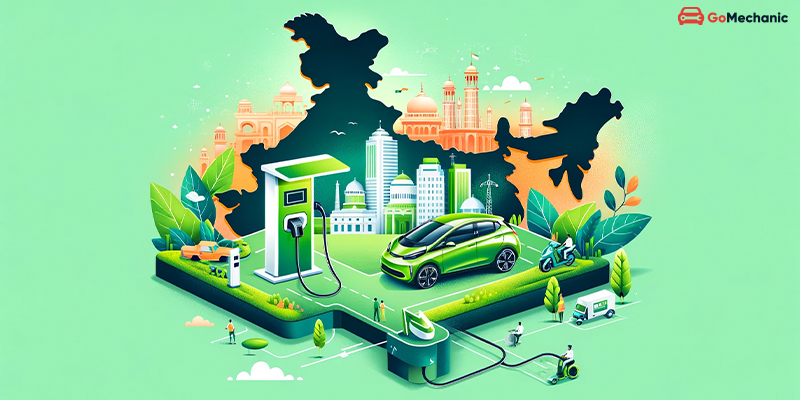Electric cars, also known as electric vehicles (EVs), have emerged as a promising alternative to traditional combustion engine vehicles in India. With a focus on reducing emissions and dependence on fossil fuels, the Indian government and various stakeholders have been actively promoting the adoption of electric vehicles in recent years. This push towards electrification aligns with global efforts to combat climate change and mitigate air pollution.
Growing Trend of Electric Vehicles
The electric vehicle trend is booming in India due to concerns about air quality and the environment. Advancements in battery tech have made EVs more practical, while government incentives like subsidies and charging infrastructure support are driving their adoption.
Advantages of Electric Cars:
- Environmental Benefits: Electric cars produce zero emissions, improving air quality and combating climate change.
- Cost Savings: Despite higher initial costs, electric cars offer long-term savings through lower fuel and maintenance expenses.
- Energy Efficiency: Electric cars convert a higher percentage of grid energy into motion, resulting in reduced energy consumption per mile.
- Noise Reduction: Electric vehicles operate quietly, contributing to decreased noise pollution in urban areas.
- Energy Security: Electric cars reduce dependence on imported fossil fuels, enhancing India’s energy security and promoting sustainable infrastructure.
Importance of Affordability
Affordability is key for economic accessibility, allowing diverse individuals to access necessities without strain. It fosters inclusivity, reduces disparities, and promotes economic stability. In essence, prioritising affordability creates a fairer and more sustainable society for all to thrive.
Budget considerations for Indian consumers:

Budget considerations are paramount for Indian consumers, influencing their purchasing decisions across various sectors. Three key subtopics underline these considerations:
Economic Diversity:
- Indians have diverse socio-economic backgrounds affecting their spending power.
- Factors like income, family size, and monthly expenses shape individual budgets.
Value for Money:
- Indian consumers prioritise quality within their budget constraints.
- They seek value across groceries, electronics, healthcare, and leisure sectors.
Market Adaptation:
- Businesses in India adjust offerings to meet varying budgetary needs.
- This ensures competitiveness while addressing consumer affordability concerns.
Significance of cars under 20 lakhs:
Cars under 20 lakhs are significant for Indian consumers due to:
- Accessibility: They cater to middle-class families and young professionals, enhancing mobility.
- Affordability: Balancing cost and features, they attract budget-conscious buyers.
- Versatility: Equipped with diverse features, they suit various needs like commuting and family trips.
- Lower Ownership Costs: Better fuel efficiency and maintenance reduce overall expenses.
- Market Demand: High affordability and aspiration drive demand, fostering competition and innovation.
Criteria for Selection
When selecting a product or service, individuals often consider various factors to ensure they make the best choice. In the context of purchasing decisions, particularly for items like cars, several criteria come into play. These include:
- Reliability: Consistency and durability over time reduce breakdowns.
- Quality: Superior performance and longevity enhance satisfaction.
- Affordability: Price aligns with budget, including ongoing costs.
- Functionality: Features and usability meet needs and preferences.
- Reputation: Positive reviews and past experiences build trust.
- Compatibility: Integration with existing systems or preferences is seamless.
- Customer Service: Prompt support and after-sales services foster loyalty.
7 Electric Cars Under 20 Lakhs in India
7. Tata Nexon EV
Specifications and Features:
- Pricing: Starts from around 14 lakhs.
- Electric Motor: 129 PS power, 245 Nm torque
- Battery Capacity: 30.2 kWh
- Range: Up to 312 km (ARAI certified)
- Features: Connected car technology, touchscreen infotainment, safety features.
- Customer Reviews:Generally praised for performance and range, some concerns about infotainment and build quality.
6. MG ZS EV
Specifications and Features:
- Pricing: Begins at approximately 20 lakhs.
- Electric Motor: 142.7 PS power, 353 Nm torque
- Battery Capacity: 44.5 kWh
- Range: Up to 419 km (ARAI certified)
- Features: Panoramic sunroof, 8-inch touchscreen, i-Smart connected features.
- Customer Reviews: Highly rated for features and range, minor issues with charging infrastructure.
5. Hyundai Kona Electric
Specifications and Features:
- Pricing: Starting from around 23 lakhs.
- Electric Motor: 136 PS power, 395 Nm torque
- Battery Capacity: 39.2 kWh
- Range: Up to 452 km (ARAI certified)
- Features: Wireless phone charging, head-up display, ventilated seats.
- Customer Reviews: Commended for build quality and long-range capability, occasional spare parts availability issues.
4. Mahindra KUV400 ev
Specifications and Features:
- Pricing: Starting from around 16 lakhs.
- Electric Motor: 150PS power, 310 Nm torque
- Battery Capacity: 39.5 kWh
- Range: Up to 456 km (claimed)
- Features: Infotainment system, smartphone connectivity, regenerative braking
- Customer Reviews:Early feedback for the Mahindra KUV400 EV is positive, praising its robust design, performance, and Mahindra’s focus on electric innovation
3. Tata Tigor EV
Specifications and Features:
- Pricing: Starts from around 11 lakhs.
- Electric Motor: 41 PS power, 105 Nm torque
- Battery Capacity: 16.2 kWh
- Range: Up to 213 km (ARAI certified)
- Features: Harman audio system, touchscreen infotainment, safety features.
- Customer Reviews: Appreciated for affordability but lacks features compared to rivals.
2. Citroen EC3
Specifications and Features:
- Pricing: Starts from around 12 lakhs
- Electric Motor: 53 PS power ,143 Nm torque
- Battery Capacity: 29.2 kWh
- Range: up to 257 Km (claimed)
- Features: Citroën’s distinctive design, comfortable interior, touchscreen infotainment, advanced safety features, potential connectivity options.
- Customer Reviews: Garners a positive initial response for its design and urban agility.
1. MG Comet
Specifications and Features:
-
- Pricing: Starts from around 7 lakhs
- Electric Motor: 42 PS, 110 Nm torque
- Battery Capacity: 17.3 kWh
- Range: 230 Km
- Features: Wireless Phone Charging, Head-Up Display, Ventilated Seats
- Customer Reviews: Anticipated excitement for features and MG’s reputation
Future Prospects of Electric Cars in India
Growth Projections and Market Trends:
- Significant growth expected in electric car adoption.
- Increasing environmental concerns and technological advancements driving the shift.
- Rising demand due to lower operating costs, improved infrastructure, and more model choices.
Government Initiatives and Incentives:

Electric Mobility Promotion Scheme (EMPS) 2024:
- Targets: Focuses on two-wheelers and three-wheelers.
- Subsidies: Offers reduced subsidies (₹5,000/kWh for battery, ₹10,000 per e2W), lower than FAME-2.
- Goal: Encourages adoption with a move away from heavy subsidies.
Key Initiatives
- Phased Manufacturing Programme (PMP): Increases domestic EV component manufacturing.
- National Mission on Transformative Mobility and Battery Storage: Boosts technological advancements and domestic battery production.
- EV30@30 Campaign: Aims for 30% EV share of new vehicle sales by 2030.
General EV Incentives
- GST Benefits: Lower GST on EVs.
- Road Tax Exemptions: Reductions or exemptions in some states.
- Registration Fee Waivers: Reduced or waived in some states.
- Income Tax Benefits: Deductions on purchase or loan interest.
- Scrapping Incentives: Benefits for scrapping old vehicles for an EV.
Challenges and Opportunities
- Challenges include high upfront costs, limited charging infrastructure, and range anxiety.
- Opportunities for innovation and investment in battery technology, charging infrastructure, and manufacturing capabilities.
- Collaboration among government, industry players, and technology providers essential for widespread adoption.
Conclusion
The blog outlines India’s evolving electric vehicle (EV) market, emphasising the role of government incentives, affordability, and technological progress in promoting EV adoption. Highlighting a range of EVs under 20 lakhs, including models from Tata, MG, and Hyundai, it illustrates the sector’s potential for growth amid challenges like upfront costs and infrastructure needs. The Electric Mobility Promotion Scheme (EMPS) 2024 and other initiatives underscore government support for this shift. Despite obstacles, the benefits of EVs, such as cost savings and reduced emissions, alongside increasing consumer options, signal a positive shift towards sustainable mobility in India.





